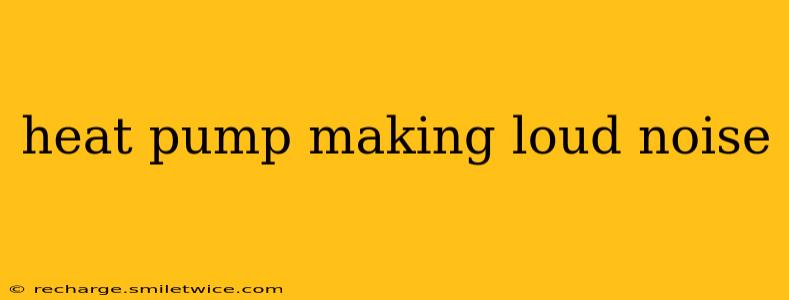A heat pump is a fantastic investment for efficient home heating and cooling, but when it starts making loud noises, the comfort it provides quickly fades. A variety of sounds, from clicking and buzzing to banging and screeching, can indicate different problems. This comprehensive guide will help you identify the source of the noise and offer solutions, ensuring your heat pump operates smoothly and quietly.
Why is My Heat Pump Making Noise?
Several factors can contribute to a noisy heat pump. These range from minor issues easily resolved with simple maintenance to more significant problems requiring professional intervention. Identifying the type of noise is the first crucial step in pinpointing the problem.
What Sounds Does a Faulty Heat Pump Make?
Let's break down the common noises and their potential causes:
1. Banging or Clanging Noises:
This is often a serious issue and shouldn't be ignored. Banging sounds usually stem from loose parts within the unit. This could be anything from a loose fan blade to more significant internal components hitting each other. Never attempt to fix this yourself. Contact a qualified HVAC technician immediately to prevent further damage.
2. Screeching or Grinding Noises:
These sounds usually indicate friction between moving parts. A screeching noise often points to a problem with the motor bearings or fan bearings. Grinding could suggest metal-on-metal contact, which also requires professional attention.
3. Clicking or Buzzing Noises:
These less severe sounds might indicate a problem with the electrical components, such as the contactor or capacitor. While less urgent than banging or grinding, it still requires professional inspection and potential repair or replacement.
4. Hissing Noise:
A hissing sound could signal a refrigerant leak. Refrigerant leaks are serious and require immediate professional attention, not only for the repair of the leak but also to ensure your safety. Refrigerant is under high pressure and can be harmful if mishandled.
5. Rattling Noise:
This is often caused by loose components within the unit, or it could be something as simple as debris obstructing the fan blades. A gentle inspection (always disconnect power first!) might reveal loose screws or debris that can be easily addressed. However, if you are unsure, it's best to call a technician.
How Do I Fix a Noisy Heat Pump?
The solutions vary greatly depending on the source of the noise.
Addressing Minor Issues:
- Check for Obstructions: Ensure nothing is blocking the airflow to or from the unit, such as leaves, debris, or overgrown plants.
- Tighten Loose Screws: Carefully inspect the unit (after disconnecting power) for loose screws or bolts and tighten them securely. This is only recommended if you are comfortable working with electrical appliances.
- Clean the Unit: Regularly cleaning your heat pump, including the coils and fan blades, can prevent many issues. Refer to your unit's manual for specific cleaning instructions.
Addressing Major Issues:
For any significant noises, such as banging, screeching, grinding, or hissing, contacting a qualified HVAC technician is crucial. They have the expertise and tools to diagnose the problem accurately and perform the necessary repairs safely. Attempting repairs yourself could worsen the issue and potentially cause harm.
How Often Should I Have My Heat Pump Serviced?
Regular maintenance is essential for keeping your heat pump running smoothly and quietly. A yearly inspection and service by a qualified technician is recommended. This will help identify and address potential problems before they escalate into costly repairs or breakdowns. This preventative maintenance will also extend the lifespan of your heat pump and ensure optimal efficiency.
Can a Dirty Air Filter Cause Noise?
While a dirty air filter won't directly cause loud noises, it can indirectly contribute to problems by restricting airflow. This can lead to the motor working harder, potentially causing increased strain and potentially leading to unusual noises over time. Therefore, regularly changing your air filter is an important part of heat pump maintenance.
Is it Expensive to Repair a Noisy Heat Pump?
The cost of repairing a noisy heat pump varies greatly depending on the issue. Minor problems like tightening loose screws might cost nothing, whereas major repairs, like replacing a motor or compressor, can be significantly more expensive. Preventative maintenance is the best way to keep repair costs down.
By carefully identifying the type of noise your heat pump is making and following the advice given here, you can take the necessary steps to ensure its continued quiet and efficient operation. Remember, when in doubt, consult a qualified HVAC technician to prevent further damage and ensure your safety.
